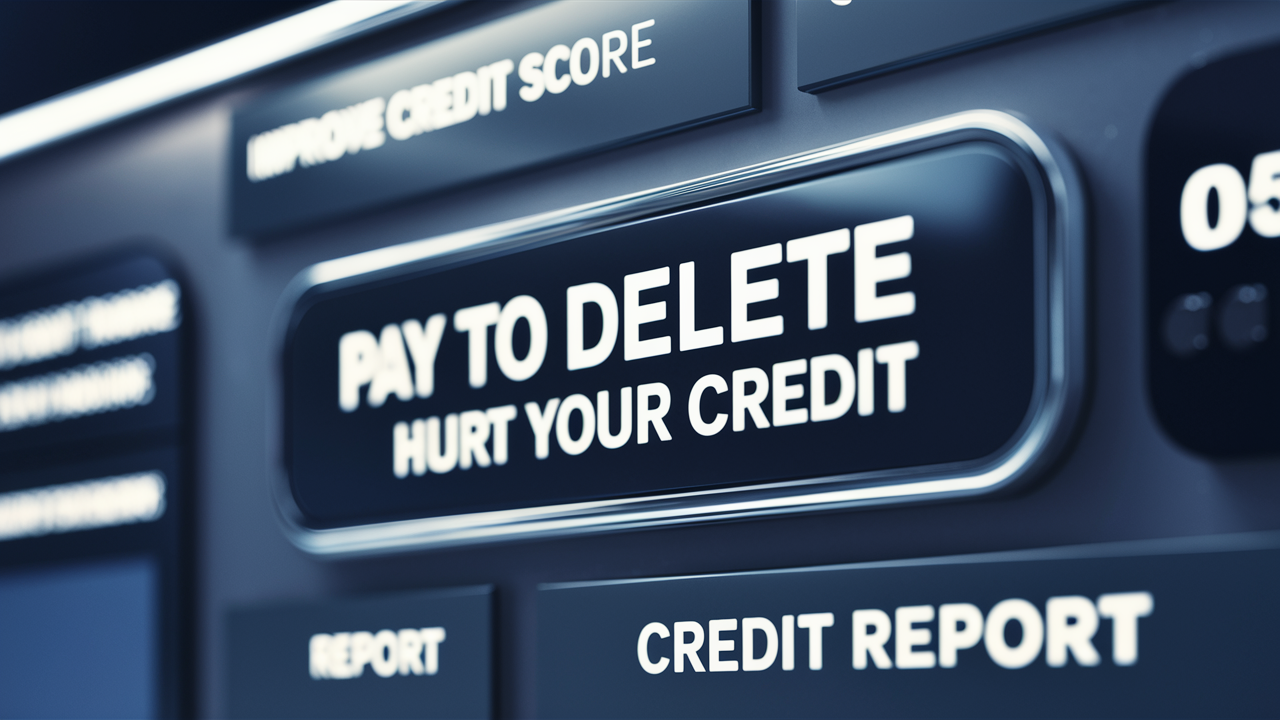-
Posted on: 17 Jul 2024

-
Your credit score is a crucial factor in your financial life, influencing everything from loan approvals to interest rates on credit cards. When faced with negative items on your credit report, the idea of a "pay-to-delete" agreement – where you pay a creditor or collection agency to remove negative information from your credit report – can seem like an appealing solution. But does pay-to-delete actually help, or could it potentially hurt your credit score in the long run? This comprehensive guide explores the ins and outs of pay-to-delete agreements, their legality, potential risks, and better alternatives for improving your credit health.
What is Pay-to-Delete?
A pay-to-delete agreement is an arrangement you make with a creditor or debt collector where they agree to remove a negative item from your credit report in exchange for payment of the outstanding debt. This could include late payments, charge-offs, or collections accounts. The premise is simple: you pay the debt, and they remove the negative mark from your credit history, theoretically boosting your credit score.
How Pay-to-Delete Agreements Are Supposed to Work
- Negotiation: You contact the creditor or collection agency and negotiate a pay-to-delete agreement. This involves explicitly stating that you will only make the payment if they agree to remove the negative item from your credit report.
- Written Agreement: It's crucial to get the agreement in writing. A verbal agreement is difficult to enforce and provides no protection if the creditor fails to uphold their end of the bargain.
- Payment: Once you have a written agreement, you make the agreed-upon payment. This might be the full amount owed or a negotiated settlement.
- Removal: The creditor or collection agency is then supposed to contact the credit bureaus (Equifax, Experian, and TransUnion) and request the removal of the negative item from your credit report.
The Risks and Drawbacks of Pay-to-Delete
While the idea of a quick fix to a damaged credit report is tempting, pay-to-delete agreements come with significant risks and potential drawbacks:
1. Creditors May Not Honor the Agreement
The biggest risk is that the creditor or collection agency may take your money but fail to remove the negative item from your credit report. This leaves you with less money and a still-damaged credit score. Even with a written agreement, enforcement can be challenging, requiring legal action and adding further expense and stress.
2. It's Often Illegal or Violates Agreements
Many debt collectors are prohibited from offering pay-to-delete arrangements by their contracts with the credit bureaus. Credit bureaus require accurate reporting of debt, and pay-to-delete violates this principle. Therefore, a debt collector might agree initially, but then be unable or unwilling to follow through due to contractual obligations.
3. Negative Items May Return
Even if a negative item is initially removed, it's possible for it to reappear on your credit report later if the creditor or collection agency sells the debt to another party. The new debt collector may not be bound by the original pay-to-delete agreement.
4. It Could Attract Scammers
The promise of a quick credit fix can attract scammers who prey on vulnerable individuals with damaged credit. These scammers may take your money and disappear, leaving you with even more financial problems.
5. It Doesn't Address Underlying Financial Issues
While removing a negative item may temporarily improve your credit score, it doesn't address the underlying financial issues that led to the negative item in the first place. Without addressing these issues, you're likely to repeat the same mistakes and damage your credit again.
Is Pay-to-Delete Legal?
The legality of pay-to-delete agreements is a complex issue. While not explicitly illegal in the sense that a law specifically prohibits it, it's often considered a violation of the Fair Credit Reporting Act (FCRA). The FCRA requires that credit reporting be accurate and fair. Pay-to-delete agreements can be seen as undermining this principle by artificially inflating a credit score with information that doesn't reflect the actual payment history.
Credit Bureau Contracts
The credit bureaus have agreements with creditors and collection agencies that require accurate reporting of information. These agreements typically prohibit pay-to-delete arrangements. Creditors who violate these agreements risk losing their ability to report to the credit bureaus.
Ethical Considerations
Beyond the legal aspects, there are ethical considerations. Some argue that pay-to-delete agreements are unethical because they create an unfair advantage for those who can afford to pay to have negative items removed, while those who cannot afford to pay are left with a damaged credit score.
Alternatives to Pay-to-Delete for Improving Your Credit
Fortunately, there are several legitimate and effective alternatives to pay-to-delete that can help you improve your credit score:
1. Check Your Credit Report for Errors
One of the most effective ways to improve your credit is to regularly check your credit report for errors. You are entitled to a free credit report from each of the three major credit bureaus (Equifax, Experian, and TransUnion) annually. You can obtain these reports through AnnualCreditReport.com.
If you find any errors, such as incorrect account information, accounts that don't belong to you, or inaccurate payment histories, dispute them with the credit bureaus. The credit bureaus are required to investigate and correct any verified errors within 30 days.
How to Dispute Credit Report Errors:
- Gather Documentation: Collect any documents that support your claim, such as payment records, account statements, or identity theft reports.
- Write a Dispute Letter: Clearly explain the error you are disputing and why it is inaccurate. Include copies of your supporting documentation.
- Send the Letter: Send your dispute letter to the credit bureau via certified mail with return receipt requested. This provides proof that the credit bureau received your letter.
- Follow Up: Keep track of the dispute and follow up with the credit bureau if you don't receive a response within 30 days.
2. Negotiate a Settlement with Creditors
If you have outstanding debts that you cannot afford to pay in full, you can try negotiating a settlement with your creditors. This involves offering to pay a reduced amount of the debt in exchange for a complete discharge of the debt.
While a settlement will still appear on your credit report as a "settled" account, it can be less damaging than a charge-off or collection account. Over time, as you build positive credit history, the impact of the settled account will diminish.
Tips for Negotiating a Settlement:
- Research: Understand your rights and the creditor's obligations.
- Be Prepared to Negotiate: Start with a low offer and be willing to negotiate to a mutually agreeable amount.
- Get it in Writing: Always get the settlement agreement in writing before making any payments.
- Make Payments on Time: Once you have a settlement agreement, make sure to make your payments on time.
3. Focus on Paying Bills On Time
The most important factor in your credit score is your payment history. Consistently paying your bills on time is the single best way to improve your credit score. Set up automatic payments or reminders to ensure that you never miss a payment.
4. Keep Credit Utilization Low
Credit utilization refers to the amount of credit you are using compared to your total available credit. Keeping your credit utilization low – ideally below 30% – can significantly improve your credit score. For example, if you have a credit card with a $1,000 limit, try to keep your balance below $300.
5. Consider a Secured Credit Card
If you have a limited or damaged credit history, a secured credit card can be a useful tool for rebuilding your credit. A secured credit card requires you to make a security deposit, which serves as your credit limit. As you make on-time payments, you build a positive credit history.
6. Credit Builder Loans
Credit builder loans are specifically designed to help individuals with little or no credit history establish credit. These loans typically require you to make fixed monthly payments over a set period. As you make on-time payments, you build a positive credit history.
7. Become an Authorized User
If you know someone with a good credit history, you can ask them to add you as an authorized user on their credit card account. As an authorized user, the account's payment history will be reported on your credit report, helping you build credit (provided the primary cardholder makes on-time payments).
The Long-Term Perspective on Credit Repair
Improving your credit score is a marathon, not a sprint. It takes time and consistent effort to build a positive credit history. Avoid quick-fix solutions like pay-to-delete, which can be risky and ineffective. Instead, focus on building good financial habits, managing your debts responsibly, and addressing any errors or inaccuracies on your credit report.
Remember that credit repair companies cannot do anything that you cannot do yourself. Be wary of companies that promise to "erase" your bad credit or guarantee a specific credit score increase. These are often scams.










